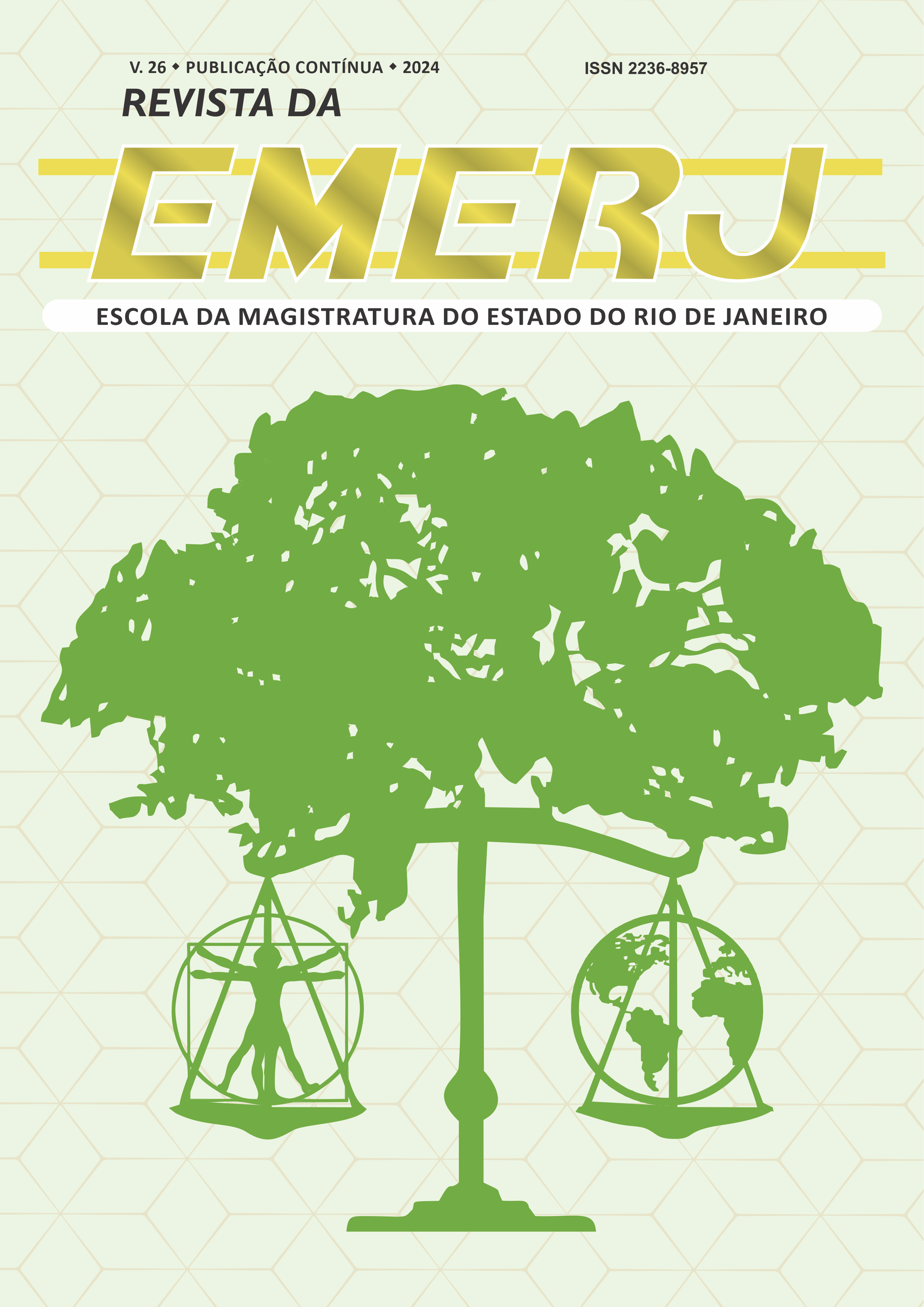Patent invalidity claim before state courts
a proposal for a systematic and teleological interpretation of article 56, paragraph 1, of the Industrial Property Law
Keywords:
intellectual property law, patent law, administrative act invalidity, legal hermeneuticsAbstract
This essay aims to address the divergence over the interpretation of Article 56, paragraph 1, of the Industrial Property Statute, which provides for the incidental patent invalidity claim before state courts. We resort to legal hermeneutics to try to extract from this legal provision a norm that represents a viable alternative to the antagonistic positions found in doctrine and case law, capable of overcomeing the problems generated by such positions.
References
BARBOSA, Denis Borges. A nulidade incidental de marca. [S.l.:s.n.], 2012. Disponível em: https://www.dbba.com.br/wp-content/uploads/a-nulidade-incidental-de-marca-janeiro-de-2012.pdf. Acesso em: 12 out. 2023.
BRASIL. Superior Tribunal de Justiça. Agravo Interno no Recurso Especial nº 1.332.417/RS. Recorrente: Junior Camilo Fernandes e Outro. Recorrido: Antônio A. de Freitas. Relator: Ministro Marco Buzzi. Brasília, 06 de abril de 2022a.
BRASIL. Superior Tribunal de Justiça. Agravo Interno no Recurso Especial nº 1.558.149/SP. Recorrente: Semp Toshiba S/A. Recorrido: Koniklijke Philips Electronics N V. Relator: Ministro Marco Buzzi. Brasília, 04 de fevereiro de 2022b.
BRASIL. Superior Tribunal de Justiça. Recurso Especial nº 1.843.507/SP. Recorrente: Eletro Metalúrgica Venti Delta Ltda. Recorrido: Sidnei Evaristo Mazocco. Relator: Ministro Paulo de Tarso Sanseverino. Brasília, 29 de outubro de 2020a.
BRASIL. Superior Tribunal de Justiça. Suspensão de Liminar e de Sentença nº 2819/MA. Requerente: Município de Magalhães de Almeida. Requerido: Tribunal de Justiça do Estado do Maranhão. Interessado: Estado do Maranhão. Relator: Ministro Presidente Humberto Martins (decisão monocrática). Brasília, 22 de outubro de 2020b.
BRASIL. Tribunal de Justiça do Distrito Federal e Territórios. Apelação Cível nº 0701819-07.2020.8.07.0018. Relator: Desembargador João Egmont. Brasília, 07 de julho de 2023.
CÂMARA JÚNIOR, Eduardo da Gama. Reflexos e efeitos das ações de nulidade de patentes nas ações de infração de patentes. Revista da ABPI, n. 120, set./out. 2012.
CREMERS, Katrin et al. Invalid but infringed? An analysis of the bifurcated patent litigation system. Journal of Economic Behavior & Organization, v. 131, 2016, p. 218-242.
CUNHA, José Ricardo. Fundamentos Axiológicos da hermenêutica jurídica. In: BOUCAULT, Carlos E. de Abreu; RODRIGUEZ, José Rodrigo (org.). Hermenêutica Plural. São Paulo: Martins Fontes, 2005.
IDS – INSTITUTO DANNEMANN SIEMSEN DE ESTUDOS DE PROPRIEDADE INTELECTUAL. Comentários à Lei da Propriedade Industrial. Rio de Janeiro: Renovar, 2005.
LABRUNIE, Jacques. Direito de Patentes: condições legais de obtenção e nulidade. Barueri: Manole, 2006.
MAXIMILIANO, Carlos. Hermenêutica e Aplicação do Direito. 21. ed. Rio de Janeiro: Forense, 2017.
PENNA, Sérgio F. P. de O.; MACIEL, Eliano Cruxên B. de Almeida. Técnica legislativa: orientação para a padronização de trabalhos. Brasília: Senado Federal, Secretaria Especial de Editoração e Publicações, 2002.
SCHMIDT, Lélio Denícoli. O reconhecimento incidental de nulidade de registro de marca ou privilégio de patente. Revista da ABPI, n. 22, maio/jun. 1996.
Downloads
Published
How to Cite
Issue
Section
License
Copyright (c) 2024 Tatiana Machado Alves, Roberto Rodrigues Monteiro de Pinho

This work is licensed under a Creative Commons Attribution 4.0 International License.
Authors who publish in this Journal agree to the following terms:
- Authors retain copyright and grant the Journal of Constitutional Research the right of first publication with the article simultaneously licensed under the Creative Commons - Attribution 4.0 International which allows sharing the work with recognition of the authors and its initial publication in this Journal.
- Authors are able to take on additional contracts separately, for non-exclusive distribution of the version of the paper published in this Journal (eg.: publishing in institutional repository or as a book), with a recognition of its initial publication in this Journal.
- Authors are allowed and encouraged to publish their work online (eg.: in institutional repositories or on their personal website) at any point before or during the submission process, as it can lead to productive exchanges, as well as increase the impact and the citation of the published work (see the Effect of Open Access).



















